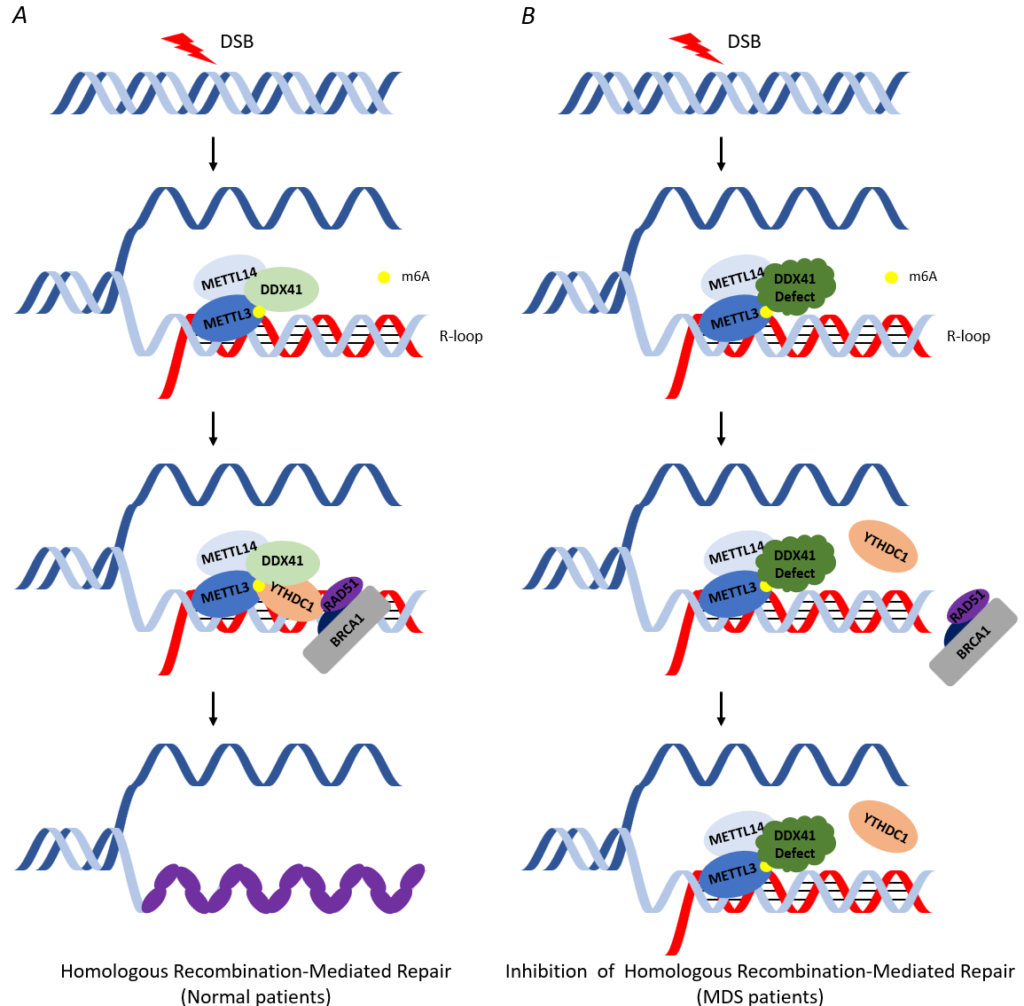A groundbreaking study, led by Professors Hongtae Kim and JaYil Lee from the Department of Biological Sciences, in collaboration with researchers from the Catholic University of Korea, sheds light on the pivotal role of mutated DDX41 protein in the pathogenesis of Myelodysplastic Syndrome (MDS), a form of blood cancer. This research uncovers the intricate association between genomic instability and the development of leukemia, offering novel insights into potential therapeutic targets for MDS treatment.
MDS is characterized by the suppression of normal blood cell production in hematopoietic stem cells, leading to a reduction in peripheral blood cell count. If left untreated, MDS can progress to Acute Myeloid Leukemia (AML), particularly affecting male patients over the age of 65.
By analyzing DDX41 mutations in 336 MDS patient samples in Korea, the research team identified that the Y259C mutation is linked to a worsened prognosis in MDS patients. Unlike the globally prevalent R525H somatic mutation, Y259C represents an intrinsic mutation specific to East Asian populations, notably in Korea and Japan.

Figure 1. A schematic image, showing the impact of DDX41 mutations on MDS patients
DDX41, a protein involved in DNA repair processes, plays a crucial role in maintaining genomic stability. Mutations in DDX41 lead to increased genomic instability through the formation of R-loop structures, where RNA binds to damaged DNA. The RNA within the R-loop undergoes m6A modification, which regulates genomic stability by stabilizing the precarious R-loop structure.
Notably, the study revealed a significant elevation in “R-loops with m6A” levels in DDX41 mutant patient samples compared to normal controls, indicating a failure in proper DNA damage repair mechanisms. Furthermore, the research elucidated how DDX41 mutations disrupt the regulation of m6A-modified R-loops, contributing to the development of leukemia.
Within the R-loop structure, m6A modification is facilitated by the METTL3 and METTL14 complex, with the YTHDC1 protein responsible for recognizing m6A and recruiting DNA repair proteins. Normal DDX41 acts as a crucial mediator, facilitating the interaction between the m6A complex and the YTHDC1 protein. However, mutations in DDX41 impede this critical function, resulting in suppressed recruitment of DNA repair proteins, heightened genomic instability, and potential leukemia development.
Professor Kim Hong-tae expressed, “This study unveils the intricate molecular mechanisms of DDX41, a frequently mutated gene in blood cancer, laying the groundwork for strategies to combat leukemia.”
Supported by the Natioan Research Foundation (NRF) of Korea, the Ministry of Science and ICT (MSIT), and Samsung Science and Technology Foundation, the study findings were recently published online in Leukemia, a prestigious international academic journal, on March 21, 2024.
Journal Reference
Won Chan Hwang, Kibeom Park, Silvia Park, et al., “Impaired binding affinity of YTHDC1 with METTL3/METTL14 results in R-loop accumulation in myelodysplastic neoplasms with DDX41 mutation,” Leukemia, (2024).














